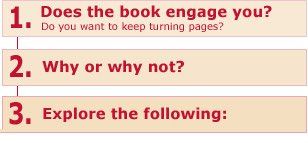How to Read-Think-Talk (about a book)
• Are the characters convincing?
Do they come alive for you? How would you describe them — as
sympathetic, likeable, thoughtful, intelligent, innocent, naive, strong
or weak? Something else?
• Do you identify with
any characters? Are you able to look at events in the book through their
eyes—even if you don’t like or approve of them? Do they remind you of
people in your own life? Or yourself?
• Are characters developed psychologically
and emotionally? Do you have access to their inner thoughts and
motivations? Or do you know them mostly through dialogue and action?
• Do any characters change or grow by the end of the story? Do they come to view the world and their relationship to it differently?
• Is the story plot-driven, moving briskly from event to event? Or is it character-driven, moving more slowly, delving into characters' inner-lives?
• What is the story’s central conflict—character
vs. character...vs. society...or vs. nature (external)? Or an emotional
struggle within the character (internal)? How does the conflict create
tension?
• Is the plot chronological? Or does it veer back and forth between past and present?
• Is the ending a
surprise or predictable? Does the end unfold naturally? Or is it forced,
heavy handed, or manipulative? Is the ending satisfying, or would you
prefer a different ending?
• Who tells the story—a character (1st-person narrator)? Or an unidentified voice outside the story (3rd-person narrator)? Does one person narrate—or are there shifting points of view? • What does the narrator know? Is the narrator privvy to the inner-life of one or more of the characters...or none? What does the narrator let you know?
• What about theme—the larger meanings behind the work? What ideas does the author explore? What is he or she trying to say?
• Symbols intensify meaning. Can you identify any in the book—people, actions or objects that stand for something greater than themselves?
• What about irony—a
different outcome, or reality, than expected. Irony mimics real life:
the opposite happens from what we desire or intend...unintended
consequences.
(Read-Think-Talk by LitLovers. Please feel free to use, online or off, with attribution. Thanks.)
|
||||||||||
